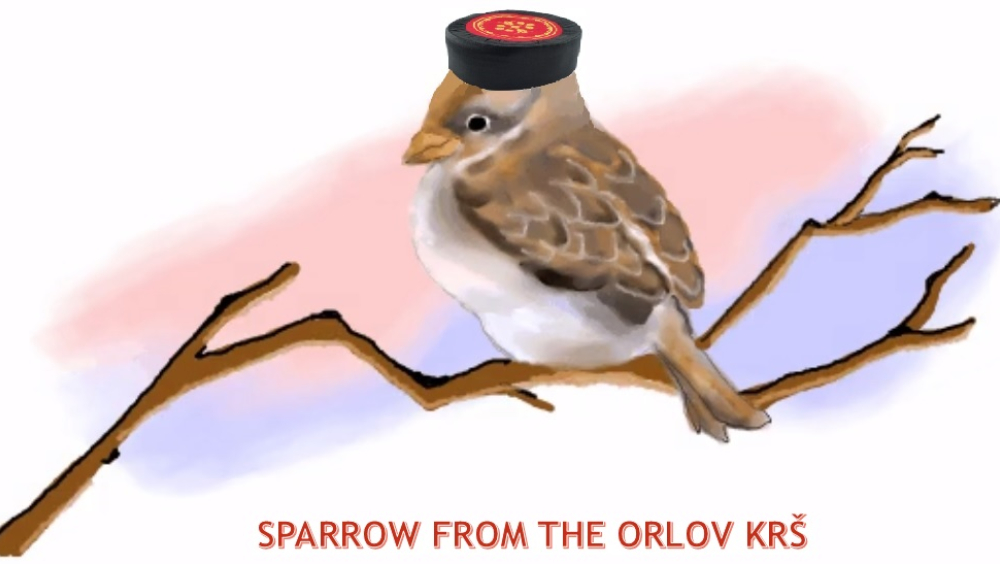Sparrow from Orlov krš
A sparrow Boško [Boshko], in the story before you, meets withswallow Marija [Maria] in Cetinje, the royal capital of Montenegro, where, on a famous historical spot, they have a conversation about her departure to the south, to warmer places, and his decision to stay the winter in Montenegro. In that conversation, which is kind of a travel through the country and its past and present, Boško and Marija present the abundance and diversity of Montenegro's culture, heritage, as well as the most interesting part of Montenegro’s historical heritage treasury to Europe and the world. In this story, you will learn why the swallow Marijatells the story about Montenegro throughout Europe, and also about the sparrow Boškowhom she will find even more in love with the skies over his country the very next spring.
A Sparrow from Orlov krš[orlovkersh]
It is autumn in Cetinje.A sparrow Boško tilted hisMontenegrincap and, behind the famous Orlov krš,observed the swallows that rush south.He was not pleased that they were leaving Montenegro. He is, naturally, going to staybut it crosses his mind that epic poetry has not paid its debt to him for that, and that it would be good to sing a little bit about sparrows, too, along with the instrument of gusle that people take as a souvenir.
−Marija, what are you carrying? – he asked a swallow from Podgorica [Podgoritsa] he knew well, who came to Montenegro only because of the walls in Stara Varoš [staravahrosh].
−Bits and pieces, souvenirs... – she replied.
−Don’t you think it’s better for you to stay here and take a leap from Lovćento Kotorcitadelwhenever you feel like, than to watch them on the picture till springtime? You don’t even know what Cetinje is like in the winter, when the famous embassiesget covered with snow, what Nikšić is like when you observe the stars from the Carev most [tsarevmorst], what Novi is like when the majorettesroam its promenade, andthe City of stairs, flowers and sunturns yellowwith mimosas?In the middle of winter! And if you mind the noise – Mamula is close!
Marija wanted to say something but the model of Piva monastery became too heavy for her, so she flew down, closer to Boško, so as not to cruise round Orlovkrš.
−Did you know, Marija, asked Boško, that there is snow on Durmitor [Dourmetor] even in summer!? You didn't! So, what’s the difference then? What prevents you from staying and seeingwhat are mountain eyes like when they turn white? And if it gets really cold for you, we can go together to Skadar lake.I know a place in Žabljak Crnojevića [ZhabliakCernoyehvicha] where wind and cold can’t hurt us! And how much history is compiled there!
−Well, I don’t know,…I prefer being on theMillenniumBridge in Podgorica, onSkaline [skaleenair], somewhere round Nemanjin grad [Nemanyin grad], downtown, flying overHercegovačkaulica [Hairtsegovachkahoolitsa], up to Dioclea the furthest. There’s history, too! And the ancient one! The most beautiful one! The real history! Do you know, Boško,that “Podgorica chalice”, which is now kept in Hermitage, Sank Petersburg, was discovered in Dioclea in 1873? And do you know that my grandma, who was a proper lady, told me that some of our ancestorsdined with archaeologistson the remains of the ancient Dioclea!?
−You’re telling me! Marija, darling, do you know that my ancestorsshared a piece of bread with the printer in Cetinje, in the first South Slavonic printing house, Printing House of Crnojević, right there, in Obod, heigh! – boasted Boško.
−That’s all so nice, Boško, but it’s in the hills, among karst...
−It is! But, even Lovćen would be, as the wise men said, just another hill if there were not for Njegoš [Neggosh]! I don’t want to be pushy, but if you want to go further south, you can stay the winter inUlcinj [Ooltsin]. Its Old Town and the medieval town ofŠas[Shuss] are ideal for that. The Great Beach. The sea scent. Where can it be more beautiful than there! Surely, you’ve heard that the famous Spanish writer Cervantes was a slave toUlcinj pirates in his youth and that his well-known work “Don Quixote” is associated with his very captivity in Ulcinj. Stay, who knows, you might be somebody’s new Dulcinea – persuaded her Boško tirelessly.
In the middle of the conversation, another swallow came by and drew Marija’s attention that they should leave. Understanding that she was ready to move, Boško addressedMarijaso that other swallowshear:
−Do you know that Vito’s poem“Myrespects, sparrows?”
−I do, Boško. And do you knowwhat it was originally titled?
−“Spring”! – replied Boško as quick as a flash.
−Well, see you then – said Marija and flew away carrying a handful of souvenirsthat will smell like Montenegro until her next return.
She will tell the story of Montenegro, and about Boško, too, whom she will find even more in love with the skies over his country next spring.
This project will enable showing key points, that clearly depict the link among European civilisations in the light of common European history. These, firstly, refer to ancient civilisation, as well as medieval ones, in this region, that left their traces and consequences on the entire history of Europe. Some parts of the story clearly refer to certain historical facts but, moreover, to their unbreakable bond with relevant European addresses, cultures and movements(Dioclea, as a link between the ancient and modern Europeancivilisations; and Ulcinj and its Old Town, too, where the author of the unsurpassable “Don Quixote”, famous Miguel de Cervantes was held captivated). All of the above should serve to actual promotion and development of mutual cultural values and their adoption. The impact of our action on the European levelimpliesawokeninterestfor wider framework and understanding of European values both of the Montenegro population for Europe and of the European population for Montenegro. That means attracting notice to the values of tangible and intangible cultural heritage of Montenegro, as well as aspecial focus to theirorganiclink with theEuropeanheritage of that age.
